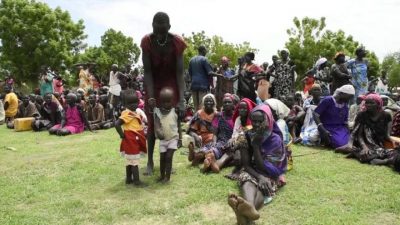By
Peter Louis
Hundreds of thousands of South Sudanese face severe food shortages and an alarming hunger situation after two years of fighting in the country, the International Committee of the Red Cross, the International Federation of Red Cross and Red Crescent Societies and the South Sudan Red Cross stated.
“Hundreds of thousands of South Sudanese face a critical food shortage,” said Juerg Eglin, head of delegation for the ICRC in South Sudan. “The level of hunger is severe. Medical needs are high. Life in South Sudan is both chaotic and dangerous, and we are trying to help by improving access to food and health care.”
Though a peace agreement has been signed, the humanitarian consequences of two years of conflict remain extremely concerning. Aside from massive food needs, many people are separated from their loved ones and millions still desperately hope to return to their homes.
For many in South Sudan the last two years have been a life on the run — in search of food and health care and from the dangers of warfare and sexual assault.
Together with the ICRC, the Red Cross Movement is working to address the most pressing humanitarian needs across South Sudan. The IFRC and the South Sudan Red Cross are supported by the Australian, Canadian, Danish, Dutch, Norwegian, Swedish and Swiss Red Cross societies.
Through a series of stories, videos and photos, the ICRC this month is showing what life has been like for many in South Sudan the last two years. To underscore the difficulties of daily life for those on the run in South Sudan, three questions are posed that frame the hardships:
In the village of Kolapach in Jonglei state, thousands of hungry, displaced people have gathered. Nyathon Pur, who fled violence in her hometown of Malakal, lives under a tree with her children and grandchildren. “My children are still really hungry,” Pur said after cooking grains from an ICRC food distribution for 24,000 people. “But I am just protecting them. If I cook all the food at once tomorrow they will have nothing.”
Kodok’s hospital was caught in the cross fire of fighting in July. Two people were killed and 11 patients died in subsequent days as South Sudanese staff and ICRC surgical teams were forced to leave the hospital. Despite having a bullet wound in his leg, patient Joseph Deng also had to flee. “The attack was a bad experience for all of us, including the doctors,” he said.
Thousands of people who flee violence become separated from family members and have no way to contact them. With support from South Sudan Red Cross staff and volunteers across the country, the ICRC provides short but essential satellite or mobile phone calls for family members to connect. Photographer Giles Duley documented such calls by constructing a Do-It-Yourself photo studio in the town of Akobo to take touching portraits of family members connecting by phone.



No Comments Yet!
You can be first to comment this post!